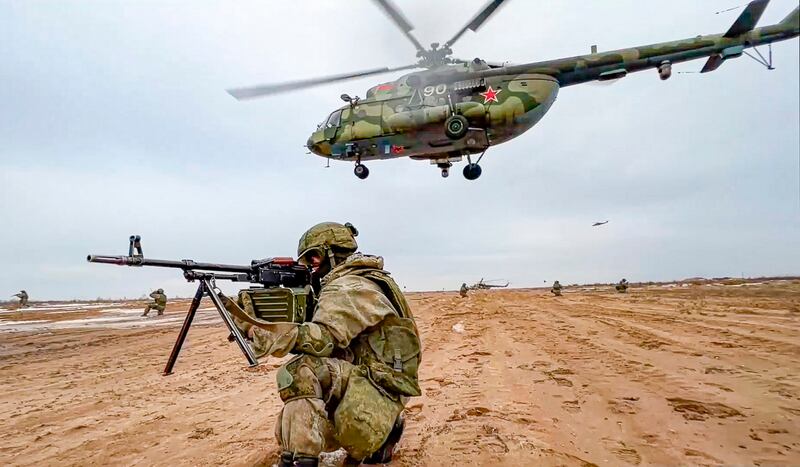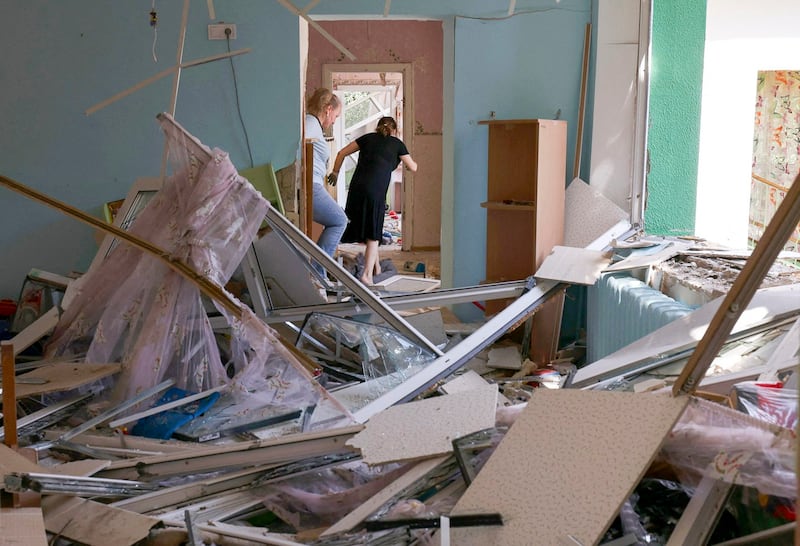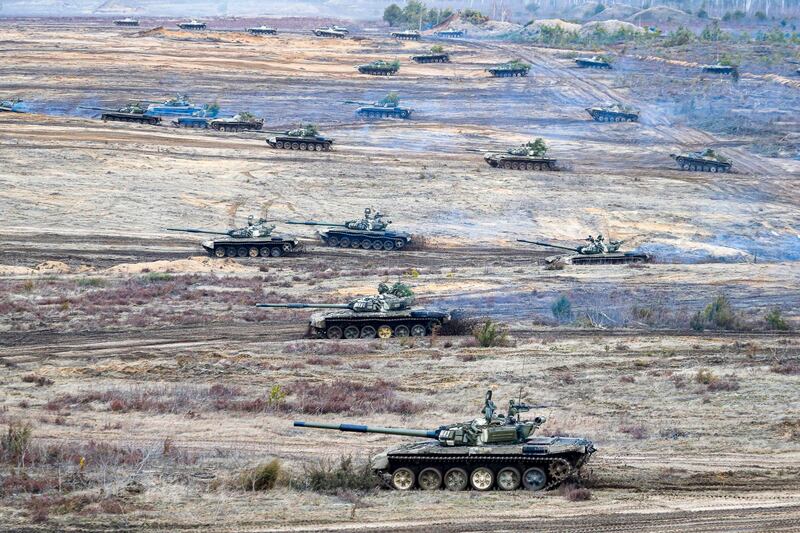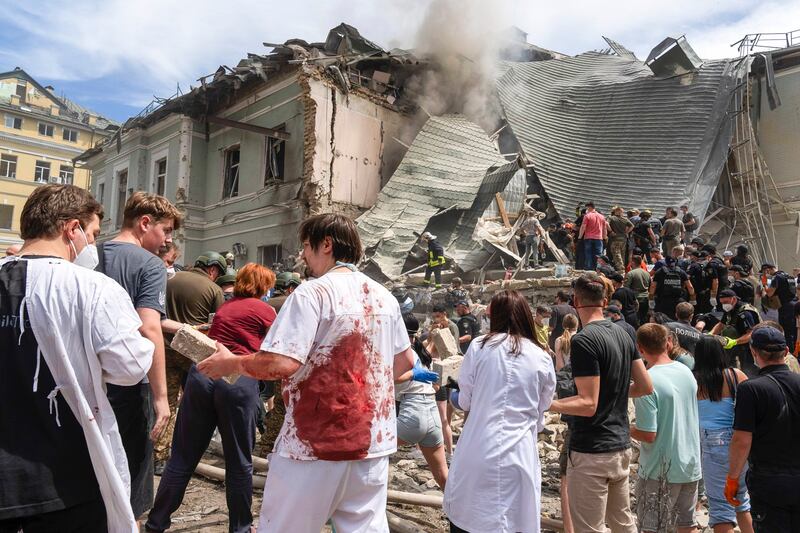China is a “decisive enabler” of Russia’s invasion of Ukraine through its support for the country’s defense industry, says a statement issued by the 32 NATO members at a summit in Washington on Wednesday.
The Chinese and Russian militaries meanwhile held joint military exercises in western Belarus – a staunch ally of Moscow – close to the border with NATO member Poland, but Beijing publicly denied that the exercises were aimed at this week's NATO summit in Washington.
Speaking on the first full day of the 75th anniversary summit of NATO at the Walter E. Washington Convention Center, U.S. President Joe Biden said that Russia was on a “wartime footing” and looking to its authoritarian allies to provide resources for its war in Ukraine.

“They're significantly ramping up their production of weapons, munitions and vehicles, and they're doing it with the help of China, North Korea and Iran,” Biden said at the opening, calling on the NATO members to similarly increase defense spending to keep up.
“We cannot allow the alliance to fall behind,” he said, before asking the gathered press to leave the room so the summit could start.
In a joint statement later issued by the 32 NATO member states, the alliance called for Beijing to stop enabling Moscow's invasion of Ukraine by providing the inputs its military needs to produce weapons and hardware amid otherwise tight U.S.-led trade sanctions.
“The PRC has become a decisive enabler of Russia's war against Ukraine through its so-called no-limits partnership and its large-scale support for Russia's defense industrial base,” the NATO statement says, using an acronym for the People’s Republic of China.
“This increases the threat Russia poses to its neighbours and to Euro-Atlantic security. We call on the PRC, as a permanent member of the United Nations Security Council with a particular responsibility to uphold the purposes and principles of the U.N. Charter, to cease all material and political support to Russia’s war effort.”
The statement also promises the establishment of a joint NATO training center in Poland, which also shares its eastern border with Ukraine.
Related stories
[ Blinken to visit China amid claims about Russia supportOpens in new window ]
[ Sino-Russian alliance has ‘concrete, tangible’ goals, analysts sayOpens in new window ]
[ Putin talks tech, energy cooperation in China's HarbinOpens in new window ]
It’s not the first time accusations about Chinese support for Russia’s military industrial base have been made by NATO countries.
Ahead of a trip to Beijing in April, U.S. Secretary of State Antony Blinken accused China of "fueling" the war in Ukraine through a "supply of inputs" required by Russia's defense industry, such as machine tools, microchips and dual-use goods with military uses.
At a panel event at the summit on Wednesday, Blinken put precise numbers on the claim, saying “70% of the machine tools” and “90% of the microelectronics” arriving in Russia were coming from China.

“We’ve seen a massive buildup of its weaponry over the last year and a half – tanks, missiles, munitions,” he said. “That’s the product of a defense industrial base being fueled by China. As a result, European allies understand the challenge posed by China to Europe’s security.”
China, for its part, has not denied the claims, but has insisted it “has every right to normal economic and trade cooperation” with Russia.
Drills in Belarus
At a press briefing in Beijing earlier Wednesday, Chinese Foreign Ministry spokesperson Lin Jian appealed for NATO to stay in its lane as an alliance between Europe and North American countries.
“China’s position on NATO is consistent,” Lin said. “We firmly oppose NATO acting beyond its characterization as a regional defensive alliance, inserting itself into the Asia-Pacific to incite confrontation and rivalry, and disrupting the prosperity and stability in this region.”
Lin also denied that China's ongoing military training with Russia's military in Belarus was related to the NATO summit, saying it was part of a deal inked last week when Belarus became the latest member of a Central Asia-focussed regional group led by Russia and Beijing.
“The joint army training is part of the annual cooperation plan between China and Belarus,” he said. “It is normal military exchange and cooperation between China and Belarus and within international law and common practices, and it’s not directed at any particular country.”

Yet against Beijing's appeals for NATO to keep its focus solely on the Atlantic, the pact's leaders have welcomed allies across Asia and the Pacific as observers this year, noting Russia's expansion of its footprint through a reliance on China and North Korea to supply its war effort.
Attending this year’s summit are Japanese Prime Minister Fumio Kishida, South Korean President Yoon Suk Yeol, New Zealand Prime Minister Christopher Luxon, who are each attending for the third year in a row, as well as Australian Deputy Prime Minister Richard Marles.
‘A stake in our success’
NATO leaders have been unapologetic about expanding the alliance’s footprint to Asia by including longtime Western allies at summits.
At the opening of the summit on Tuesday night, Biden had said NATO had become history's most successful military alliance because it had always adapted to the times since its founding with 12 members.
“We did [adapt], evolving our strategy to stay ahead of threats, reaching out to new partners to increase our effectiveness,” Biden said, pointing to non-NATO observers at the summit. “Here with us today are countries from the Indo-Pacific region. They're here because they have a stake in our success, and we have a stake in theirs.”
NATO Secretary-General Jens Stoltenberg also noted how Russia’s invasion of Ukraine is tying together continents and giving allies outside of Europe and North America a stake in NATO’s affairs.
“Our security is interlinked because Iran, North Korea and China are the main enablers of Russia’s war against Ukraine,” Stoltenberg told reporters as he arrived at the summit Wednesday morning.

At a panel event at the summit hosted by Atlantic Council CEO Frederick Kempe, Stoltenberg said that Iran and North Korea’s help to Russia was important but was dwarfed by China’s support.
“China is the main enabler,” Stoltenberg told the panel. “They are delivering the tools, the dual-use equipment, the microelectronics, everything Russia needs to build the missiles, the bombs, the aircrafts, and all the other systems that they use against Ukraine.”
An inflection in Europe-China ties could soon arrive, he added.
“If China continues, they cannot have it both ways,” he said. “They cannot … have a kind of normal relationship with NATO allies in North America and Europe, and then fuel a war in Europe that constitutes the biggest challenge to our security since the Second World War.”
Edited by Malcolm Foster.
